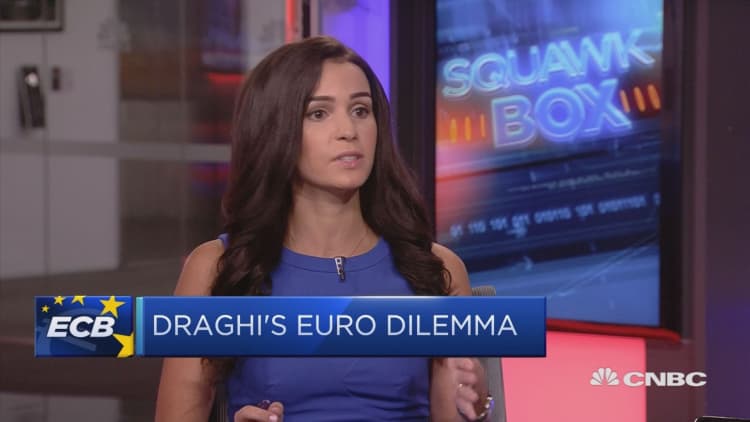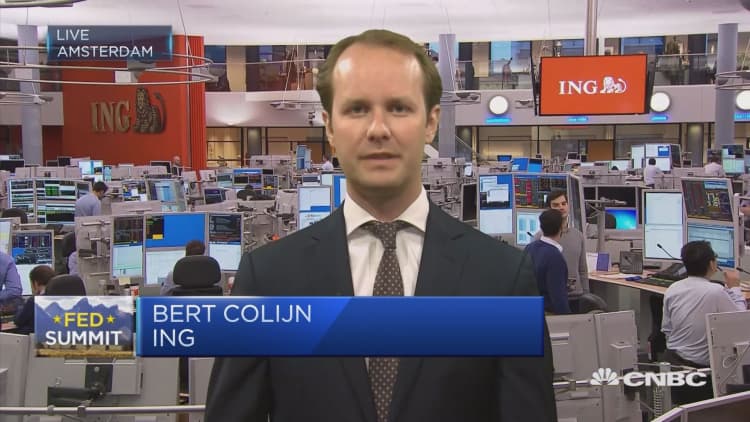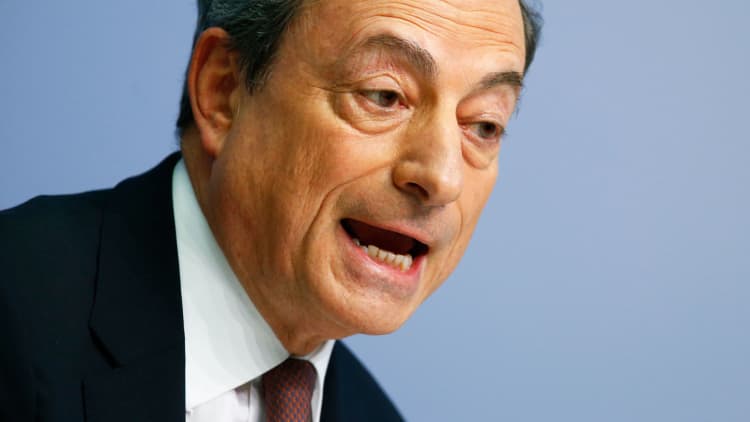
President Mario Draghi at the European Central Bank (ECB) will once again face a balancing act when he speaks to the media on Thursday afternoon, with a strong euro scuppering any talk of a quick end to the central bank's asset purchase program.
The ECB's Governing Council is largely expected to upgrade growth forecasts while simultaneously downgrading inflation forecasts. The 2019 forecast for inflation stood at 1.6 percent in June, but this used a much lower assumption for the euro-dollar exchange rate.
Since then, the currency has appreciated nearly 7 percent. According to Bank of America Merrill Lynch, a 10 percent appreciation of the currency shaves off 40 to 50 basis points off medium-term inflation forecasts. As such, the consensus is expecting a downward revision to 1.4 percent or 1.5 percent by the ECB on Thursday.
Downward revisions in inflation forecasts are typically accompanied by additional monetary accommodation, not a withdrawal. And market participants have been anticipating a "tapering" of stimulus for most of the summer. Hence the dilemma.
"We think the key reason for staying put on September 7 is the sharp rise in EUR/USD since late June – a move that the ECB will not want to turbo-charge through additional hawkish rhetoric," analysts at UBS, said in a note on Wednesday.
At a speech delivered in Sintra, Portugal on June 27, Draghi surprised the market with a more upbeat assessment of the economy, stating that: "As the economy continues to recover, a constant policy stance will become more accommodative, and the central bank can accompany the recovery by adjusting the parameters of its policy instruments – not in order to tighten the policy stance, but to keep it broadly unchanged."
This prompted market participants to anticipate that the ECB was readying for a wind-down of its asset purchase program. The speech sent the euro currency soaring and led to a 20 basis point sell-off in 10-year German bunds with the yield hitting a high of 0.60 percent back in July before re-tracing back to current levels of around 0.35 percent.
Since then, the tone out of the ECB has softened. In Jackson Hole in the U.S in August, Draghi failed to offer any insight into the central bank's quantitative easing plans.

The ECB has been buying 60 billion euros ($71.5 billion) of sovereign bonds a month since April, helping to keep bond yields supported as the net bond supply to the market has been negative. A quick end to the program would likely cause a reverse impact, leading to higher yields and market participants would likely bring forward the timing of the first rate hike. The pricing of short-dated bonds in Europe indicate that traders believe the ECB will perform a small rate hike in July 2019 and a longer 25 basis-point raise in March 2020.
In a note published this week, Goldman Sachs analysts discussed that the overall stock of purchases is more significant for QE (quantitative easing) transmission than the monthly flow amount. It stated that: "Slowing the pace of purchases should therefore have manageable consequences for bond yields as long as the stock of purchases is held in place through continued reinvestment."

The analysts are expecting the ECB to signal the end of their monthly asset purchase program soon while strengthening forward guidance so the market does not start pricing in premature hikes. Most analysts think that the ECB will defer the decision on tweaking or extending its stimulus package to October - with the focus on September being on the ECB's updated economic forecasts.
However, the ECB has typically announced changes to its QE program at September meetings. With the economic backdrop looking stronger, European equities on the rise and technical constraints on the asset purchase program due to hitting bond limits next year, perhaps the market could be in for a hawkish surprise this Thursday after all. This may prompt a further rise in the euro currency and a break through the 1.20 highs seen earlier this year against the dollar.

